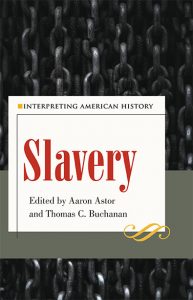Book Review: Slavery: Interpreting American History
 In Slavery: Interpreting American History, editors Aaron Astor and Thomas C. Buchanan have compiled an impressive volume that succinctly explores the changing interpretations of slavery. This is not so much a history of American slavery as it is a history of how it has been written about. From early authors who downplayed the brutality of slavery to those who fought to correct the record and modern authors that continue in-depth research, the changing interpretations are all found within these pages.
In Slavery: Interpreting American History, editors Aaron Astor and Thomas C. Buchanan have compiled an impressive volume that succinctly explores the changing interpretations of slavery. This is not so much a history of American slavery as it is a history of how it has been written about. From early authors who downplayed the brutality of slavery to those who fought to correct the record and modern authors that continue in-depth research, the changing interpretations are all found within these pages.
As an addition to Kent State University Press’s Interpreting American History series, the chapters of this volume each explore historiographical topics related to American slavery. In the words of the publisher, they survey “interpretations of important historical eras and events, examining both the intellectual shifts that have taken place and various catalysts that drove those shifts.” Writing good historiography requires detailed understanding of the topic as well as the ways people wrote about it, and the authors here meet that standard.
As Steward Henderson has discussed here on ECW, misrepresentations of slavery are still alive and well in the 21st-century. These lasting views show the impact of early historical works that declared slavery was generally benign. This volume does much to show the impact that important writers have had in creating or disproving the dangerous myths of slavery as benevolent or a necessary evil. In doing so, it proves that changing interpretations are not changing history but working to tell a more complete story with voices that had been historically silenced. Particularly impactful are Katherine Chilton’s “American Slavery and Gender” and Walter C. Rucker’s “American Slavery and Resistance.” Chilton explores how the experience of enslaved women was not researched in depth until the 1980s and proves the importance of women’s and gender history in a holistic understanding of slavery. Rucker’s chapter explores the creation of the myths of obedient, happy slaves and benevolent masters while also detailing the works that disprove those myths through careful research.
Honorable mentions for standout articles also include Colleen Vasconcellos’ exploration of the Atlantic slave trade and Aaron Astor’s coverage of emancipation and the changing debates over the roles enslaved people played in their own emancipation, though every chapter is worth reading. As described in the introduction, each chapter follows the same rough outline. They begin with primary source accounts of participants and observers, move through three distinct intermediary periods of interpretation and scholarship, and culminate in the 2000s-onward era of scholarship. In doing so they chart trends and differences while also giving readers an overview of important works they may not have heard of.
Admittedly, the historiographical approach may not work for all readers. Those who are picking up the book for narrative history may not find what they want here. However, that is not what this volume set out to do; it set out to outline the many ways the system of American slavery has been written about and described in the past. It breaks the daunting history of over two hundred years of historiographical debate into focused and digestible chapters, and it does that well. For interested undergraduates, graduate students trying to better understand a complex history, or readers who want to learn about how critical historiography is to history, this volume is an excellent addition to a bookshelf.
Slavery: Interpreting American History
Edited by Aaron Astor and Thomas C. Buchanan
Kent State University Press, 2021, $39.95 paperback

Sounds like this is a must for anyone doing serious research and writing in the filed of Black history. Long overdue. Kudos to Astor and Buchanan.
Definitely key to folks trying to parse out the historiography.
This will come in handy for my next college class in African American history. Totally snagging this up!
Thanks for bring this up.